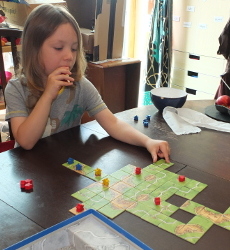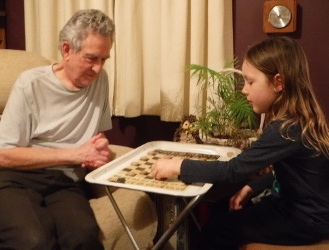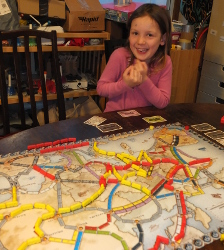



Most people appreciate that board games can help teach very young children to count and take turns, but not everyone appreciates their educational value beyond this stage. Board, dice and card games do not generally form part of the school curriculum, and yet playing these games can practice and develop an enormous range of mathematical, social, and cognitive skills.
Mathematical skills
Some games are of course specifically designed to teach mathematical skills, but these tend to be rather limited in scope. To do well in any game however, you almost always need a good grasp of probability, and an ability to rapidly calculate points that could be gained from different moves. When you add the need to factor in the potential points gained by your opponents, board games offer an excellent opportunity to practice mental arithmetic.
Cognitive Skills
Strategic board games help practice critical thinking. Players must retain information, calculate optimal moves, and problem-solve. Even the act of understanding and remembering all the rules of a complex game can give your brain a bit of a workout. Good strategy games should make you think. If your board games don't make you think, maybe it's time to invest in some new ones.
Subject Learning
Many board games have a science or history theme and can help reinforce knowledge and understanding in these areas. This is particularly true for many crowd funded, science based games.
Social Skills
Playing board games helps people to win and lose with good grace. Enjoying a challenge, without necessarily coming first every time is a really useful skill for life. Seeing a steady improvement in your own score over a long period of time is also valuable preparation for future endeavours. We've never "let" our child win, and yet HB is an incredibly enthusiastic game player.
I think our games also have a socio-political lesson to teach. Games where play becomes uneven, where one person (usually through luck or poor game design) ends up with far more resources early on, results in that player pushing ahead at the expense of the others. This makes for a far less enjoyable game - even for the winner. For a good game, gameplay needs to be fair, not just in terms of the rules, but also in terms of early resource allocation. I think this has implications for life as well as games!
Other Transferable Life Skills
Perhaps the most valuable transferable skill picked up by enthusiastic boardgame players is an ability to plan ahead. Planning skills are valuable for many jobs and life in general. Other skills include the ability to rapidly adapt in response to new variables, and to use one's creativity and initiative to problem solve.
If you'd like to read more on this topic, Board games for kids: Can they teach critical thinking? might be a good place to start (it also lists some academic studies which may be of interest).
If you'd like to expand your game collection, you might be interested in looking at some of our games. I've grouped them together, roughly by complexity level and whether or not you need to be able to read. My favourites are all in the last, most complex section, but we still enjoy many of the simpler games too.